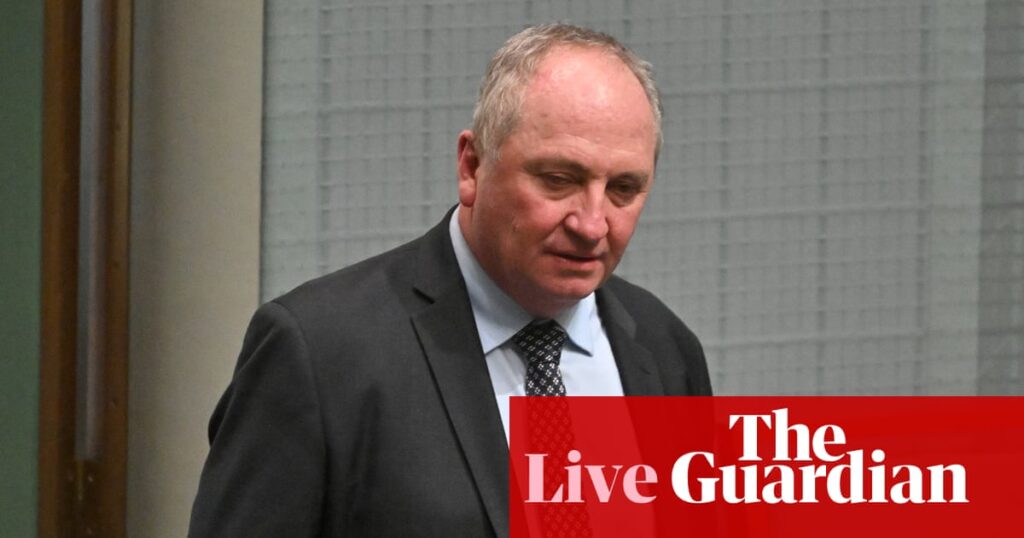Barnaby Joyce denies allegations of ‘verbal tirade’ after formal complaint by Nationals staffer

Sarah Basford Canales
A formal complaint has been filed against Barnaby Joyce after media reports alleged he launched a “verbal tirade” against a female Nationals staffer on Wednesday.
Joyce, a Nationals MP who could run as an independent or for One Nation at the next federal election, denied the allegations and said he respected the process now in train.
Sky News reported on Thursday morning that Joyce had raised his voice at a staffer within Michelle Landry’s office shortly before question time yesterday. Joyce had reportedly visited the office to request leave for this morning to attend a funeral. He was asked to complete a leave form, which prompted Joyce’s alleged outburst.
The female staffer filed the formal complaint today with the Parliament Workplace Support Service. The parliamentary HR body can offer support services to affected staff and management training courses to politicians but cannot punish MPs for their behaviour unless the complaint is also filed with the Independent Parliamentary Standards Commission.
Key events

Jordyn Beazley
Minister says court decision not a basis for NSW correction officer strike
The New South Wales corrections minister has said a decision by the independent judiciary should not be a basis for industrial action after prison officers state-wide walked off the job.
Anoulack Chanthivong said:
I understand this industrial action has been taken following the sentencing of an inmate in the Local Court of NSW over an assault on correctional officers, amid disappointment at this sentencing decision.
Corrective Services NSW has an urgent hearing before the Industrial Relations Commission today to resolve this.
The Government values the hard work of correctional officers, often in difficult and hostile circumstances. Correctional officers deserve to be safe on the job. While I understand staff are angry, a decision of the independent judiciary is not a basis for industrial action.
Centres remain secure and are being operated by a reduced number of staff.
‘I’m not going to spoil the fun’ in Senate QT, says Watt
Asked about the prospect of a lengthier question time today in the Senate, and whether the government will “play ball”, Watt indicates that he will.
The self-professed lover of question time said:
I’m not going to spoil the fun this afternoon! There might be more interesting Senate question time than there usually is.
Moderator Tom Connell joked that there’s “probably a low bar” there.
Watt didn’t comment on the threats the government has made to sack Coalition MPs from their deputy chair positions on House committees.
Is WA premier on board with the EPBC reforms?
You might remember that a big factor in the EPBC’s demise last term was that WA was not on board with the reforms.
What about this time around?
Watt says that the state was the very first place he visited after being sworn in as minister, and all of his discussions with the WA premier, Roger Cook, have been “constructive”.
Every time I’ve met with the premier it’s been a really constructive meeting. He supports reform. There’s no doubt about that. He can see the damage that’s happening to the environment and the hold up of approvals. We will continue to talk about the detail but he’s broadly supportive of reforms.
With the new legislation, the commonwealth will sign a series of bilateral agreements with the states to fix up project approvals. So far, Watt says there’s only been a function bilateral agreement with New South Wales.
So rather than someone having to roll up to the NSW government, get an assessment, approval, come to us and get an approval, we can cut through and have one assessment. That’s where we’d like to get to with WA. That’s where we’d like to get to with a lot other states.
‘Really high bar’ to approve projects in national interest under nature laws, Watt says
My colleague, Dan Jervis-Bardy is at the press club, and asks Watt whether the government will make it explicit in the legislation that projects approved in the national interest – that might not meet environmental standards – won’t include certain projects like fossil fuel projects.
Watt says the legislation will give a “flavour” of the type of decisions that could be in the national interest.
While he doesn’t indicate that the government itself would put that carve out forward, he says he’d listen if another party called for it.
The decision we made was to set out the framework for how one of those national interests decisions could be made. As I say, to give a flavour of the types of decisions that pathway would attract. We haven’t gone about sort of saying what can’t happen.
I said we’re at an early stage of the debate and haven’t received amendments from anyone yet and I’m open to listening to all parties that think about what changes are needed.
A little earlier Watt said any intervention by a minister to approve a project in the national interest would have to have “a really high bar”.
Watt confident in federal environmental reforms despite initial pushback
Jumping back to press club, Watt seems to be pretty positive about how the negotiations with the Coalition and the Greens will progress, saying he expected them both to pushback initially.
But he says everyone will have to make concessions to get something worthwhile over the line.
You would hardly expect them to be rolling over day one and saying we’re going to back in the bill. They would be poor negotiators if they did that. Inevitably they’ll be seeking concessions, changes.
I’ve said I will talk with them about that. I’ve said from day one and Graeme Samuel said this, no one will get 100% of what they’ve want. If everyone wants 100% of what they want, we will get nothing and stuck with a bill that’s failing everyone. If we get 80% of what people want, then we’ll have a pretty good set of laws that deliver for both the environment and for business.
Watt also tells us that the bill won’t suddenly mean nature regenerates immediately, or as he puts it, “we won’t have beautiful birds and bees on every street overnight”.
Graeme talked a lot about the current situation managing decline and that’s why we’ve embedded these really important principles like net gain, the national environmental standards, to not just [stop] that ongoing decline but to start seeing nature recover.
NSW prison guards walk off the job after four prison officers assaulted

Jordyn Beazley
Prisons across New South Wales will soon have barebones staff after corrective service officers declared a state-wide strike over the assault of four guards earlier this year.
Officers have so far walked off the job at Cessnock prison, and at Bathurst prison, and officers at the remaining 36 prisons will soon follow suit.
The Public Service Association has said the strike will also leave local, district and supreme courts “unable to function”.
Stewart Little, the general secretary of the union, told Guardian Australia that the walk-off was over an inmate at Cessnock assaulting four prison officers earlier this year, leaving them all with serious facial injuries.
The inmate went before a magistrate over the assault. He was found guilty but did not get any additional time added to his sentence. Little said:
My phone has gone into meltdown, I’ve had prison officers ringing me all day absolutely incandescent with rage at the signal this magistrate has sent to the community.
Little said the man has a history of violence and is now in an isolated cell.
Asked how long he expects the strike to last, Little said: “I can’t see them going back to work today”.
Little was also asked if he thinks the issue is symptomatic of any broader issues inside the state’s prisons. He told Guardian Australia that a number of the ballooning inmates inside for domestic violence offences were not getting “the wraparound services they need to deal with their violent behaviour”.
He said this was specific to offenders that spend most of their time on remand or only serve a short sentence which can limit their access to rehabilitation programs.
‘No extinctions’ under new nature laws, Watt says
On to questions, Watt is asked about unacceptable impacts of a project, and what happens if a project could result in a species going extinct.
Watt, at first, gives us the couple of extreme examples he’s so far used, like no mining under Uluru and no drilling of the Barrier Reef.
But when pressed on whether there would ever be a project in the national interest that would result in an extinction, Watt says:
Our government has a policy of zero new extinctions to begin with. My view is the way these laws would apply is that if a project is going to drive a species extinct, it will get a no. I reckon I’d be confident I’d be 99% support in the community for that.
Murray Watt speaking at press club
Murray Watt is pitching his environment reforms at the National Press Club today – after the legislation was introduced to the house this morning, five years after Graeme Samuel first handed the reforms to the former government.
The environment minister still has an uphill battle trying to get the legislation through the Senate (which just slighted the government by forcing the bill through a lengthy committee process).
He says the reforms will create national environmental standards, and will be a positive for the environment. He also pushes back against “false choice” that some have characterised.
Many commentators and politicians want to frame this legislation as a tug of war between the environment and the economy. Assert a false choice you can have one but not the other.
You don’t have to choose between the environment and jobs and business. We can protect and improve our environment, while removing duplication and speeding up approvals. That was the secret sauce of professor Samuel’s report.
Surprise amendment to give police power to cancel welfare payments

Cait Kelly
Regular readers of the blog will know yesterday parliament was discussing amendments to the income apportionment bill, which the government is trying to pass this week.
A quick recap on that: the bill will give about 3 million people affected by the unlawful debt calculation method up to $600 in compensation.
But the government, at the very last minute, have slipped in an amendment that would give the federal police minister the power to recommend the suspension or cancellation of a person’s Centrelink benefits before they are convicted.
This would apply to a “serious violent or sexual offence” and only if an arrest warrant has been issued.
Where has this come from?
Well, the amendment stipulates “it is not appropriate that a person wanted for a serious offence, including a person who is evading arrest by the police, should be able to benefit from Government payments.”
So, of course, there is a lot of speculation involving Dezi Freeman, and reports that he was on the disability support pension.
Greens, crossbench and Coalition team up again in the Senate
The government has faced another defeat in the upper house – with the opposition, Greens and crossbench teaming up to force the environment bill into an inquiry which will only hand down its report in March 2026.
The inquiry doesn’t change when the legislation can pass – as long as Murray Watt is still able to secure a deal with the Coalition or Greens, which he’s said he wants to do before the end of the year.
Albanese confident of Trump’s word on Aukus
Asked whether Albanese is concerned about commentary that the US won’t be able to deliver submarines to Australia under the Aukus partnership, the PM refers us to Trump’s comments last week.
I think President Trump’s comments cannot have been clearer and they were very clear last week in the White House. They have been clear ever since President Trump has made very explicit his – not just support for AUKUS – but indeed the bringing forward of the timetable if that is possible.

